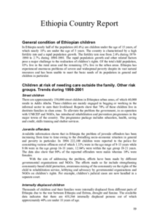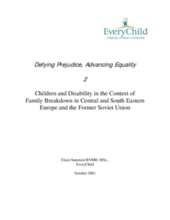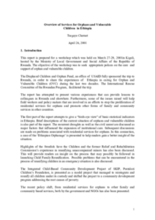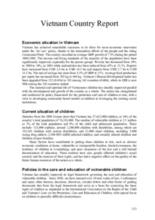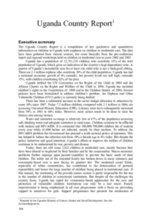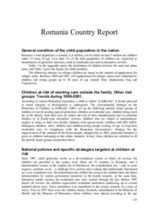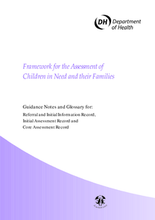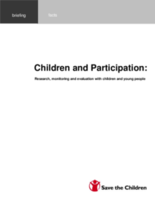Displaying 541 - 550 of 565
The purpose of this report is to document the levels of child abandonment and de-institutionalization as an indicator of the quality of social transformation during the transition decade (1990-2000).
Country report of Ethiopia on the situation of children in residential care in anticipation of the Second International Conference on Children and Residential Care: New Strategies for a New Millennium, to be held in Stockholm 12 – 15 May 2003.
A study on children with disabilities in the context of family breakdown. Includes overviews and statistics from 10 countries, a call for strengthened family support services, and draft guidelines on how child agencies can better mainstream these issues into their work.
A report on a workshop that was presented in Rwanda that sought to share the experiences of of Ethiopia in caring for orphan and vulnerable children. The aim was to provide lessons to colleagues in Rwanda and elsewhere. The report includes statistical data, information on reunification programs, and reviews recent government and NGO policy shifts.
Country report of Vietnam on the situation of children in residential care in anticipation of the Second International Conference on Children and Residential Care: New Strategies for a New Millennium, to be held in Stockholm 12 – 15 May 2003.
Country report of Uganda on the situation of children in residential care in anticipation of the Second International Conference on Children and Residential Care: New Strategies for a New Millennium, to be held in Stockholm 12 – 15 May 2003.
Country report of Romania on the situation of children in residential care in anticipation of the Second International Conference on Children and Residential Care: New Strategies for a New Millennium, to be held in Stockholm 12 – 15 May 2003.
This paper presents the results of an audit to evaluate the efficacy of the central database designed to facilitate the reunification of unaccompanied children in Rwanda with their families.
Guidance on how to complete the referral form, initial assessment and core assessment from the resource Framework for the Assessment of Children and their Families.
Discusses good practices, ethics, and tools for participatory information gathering in research, monitoring and evaluation. Detailed reference lists highlight key information sources.


